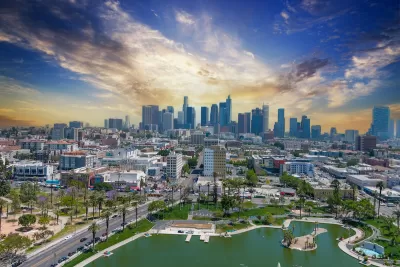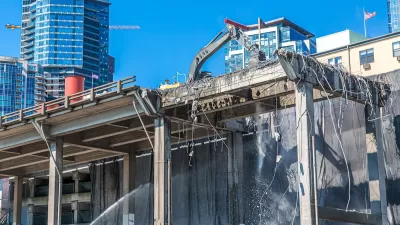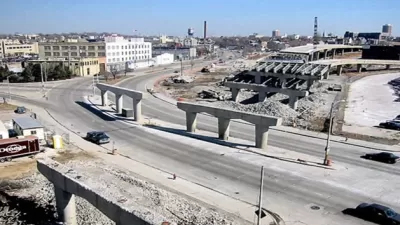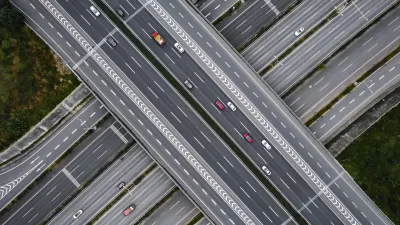Seven grant awards totaling $162 million will be used for planning, capital projects, and regional partnerships to reduce environmental harm and improve access in disadvantaged communities.

Administered by the U.S. Department of Transportation (DOT), the Reconnecting Communities and Neighborhoods (RCN) Program seeks to:
- Prioritize disadvantaged communities;
- Improve access to daily needs such as jobs, education, healthcare, food, and recreation;
- Foster equitable development and restoration;
- Reconnect communities by removing, retrofitting, or mitigating highways or other transportation facilities that create barriers to community connectivity, including to mobility, access, or economic development.
As reported by Joe Linton in this article, RCN grants totaled $237 million for California. Of that, L.A. County secured about two-thirds: $162 million. Over 90 percent of this funding goes to Metro, nearly all of that for one $139 million grant to fund 14 miles of bus priority lanes, 23 miles of bus corridor enhancements (i.e. transit signal priority, all door boarding, and bus shelters), 60 Metro Bike Share stations plus first-last-mile improvements, and five mobility hubs.
Three of the grants for L.A. County seek to reconnect and/or expand parkland, including:
- $800,000 to L.A. County for the Reconnecting East Los Angeles: 60 Green Bridge Project for Belvedere Park - planning. The county will plan for a cap to be developed over the 60 Freeway bridging the two sides of Belvedere Park, near the East L.A. Civic Center, the current terminus of the Metro E Line.
- $2 million to L.A. City for Reconnecting MacArthur Park - planning. Championed by L.A. City Councilmember Eunisses Hernandez, this project would plan for permanently closing Wilshire Boulevard from Alvarado Street to Carondelet Street and bridging the two sides of MacArthur Park.
- $3.6 million to Friends of Hollywood Central Park (FHCP) for Healing Hollywood - planning. The nonprofit organization FHCP is planning a large scale (37.6 acre) park capping the 101 Freeway, which will include five miles of walk/bike paths and more.
For more information, please read the source article.
FULL STORY: Rundown of New Federal Reconnecting Communities Grants for L.A. County

Study: Maui’s Plan to Convert Vacation Rentals to Long-Term Housing Could Cause Nearly $1 Billion Economic Loss
The plan would reduce visitor accommodation by 25,% resulting in 1,900 jobs lost.

Alabama: Trump Terminates Settlements for Black Communities Harmed By Raw Sewage
Trump deemed the landmark civil rights agreement “illegal DEI and environmental justice policy.”

North Texas Transit Leaders Tout Benefits of TOD for Growing Region
At a summit focused on transit-oriented development, policymakers discussed how North Texas’ expanded light rail system can serve as a tool for economic growth.

Paris Bike Boom Leads to Steep Drop in Air Pollution
The French city’s air quality has improved dramatically in the past 20 years, coinciding with a growth in cycling.

Why Housing Costs More to Build in California Than in Texas
Hard costs like labor and materials combined with ‘soft’ costs such as permitting make building in the San Francisco Bay Area almost three times as costly as in Texas cities.

San Diego County Sees a Rise in Urban Coyotes
San Diego County experiences a rise in urban coyotes, as sightings become prevalent throughout its urban neighbourhoods and surrounding areas.
Urban Design for Planners 1: Software Tools
This six-course series explores essential urban design concepts using open source software and equips planners with the tools they need to participate fully in the urban design process.
Planning for Universal Design
Learn the tools for implementing Universal Design in planning regulations.
Smith Gee Studio
Alamo Area Metropolitan Planning Organization
City of Santa Clarita
Institute for Housing and Urban Development Studies (IHS)
City of Grandview
Harvard GSD Executive Education
Toledo-Lucas County Plan Commissions
Salt Lake City
NYU Wagner Graduate School of Public Service





























